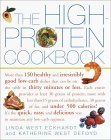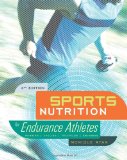Protein: In a Nutshell
Protein is a nutrient. Proteins are made out of really big molecules, which consist of amino acids. Proteins are essential to the structure and function of all living cells. Proteins contribute to various important functions in different parts of the body.
Protein: In-depth
Alongside carbohydrates and fat, proteins are one of the main components of the human diet. It is possible to leave fat out of a diet for a certain amount of time but the body needs a constant supply of protein as the body cannot synthesise any by itself. The human body is made up of 15 - 20% protein which is constantly being composed and decomposed. As opposed to carbohydrates and fat, protein contains nitrogen and sulphur, which are essential elements for the body.
Proteins consumed in food are different to proteins in the human body as they have different amino acid combinations. For this reason the proteins are decomposed in the intestines by enzymes into their separate components (amino acids). They pass through the intestinal walls and are recomposed according to the body's demand for protein.
Proteins are composed in varied ways out of more than 100 amino acids. Each protein is individually composed which means that the amino acids are placed in a certain order. This is called a sequence. Each type of protein has a specific characteristic. Roughly estimated, our bodies have up to 50.000 different proteins each of which has a different role in the body. The body's own proteins are made out of ca. 20 different amino acids.
There are two types of amino acids; the first are referred to as non-essential amino acids which are synthesised in the body and the second type are the essential amino acids (10 of them) which cannot be synthesised by the body and therefore must be included in the diet.
Classification of Amino Acids
- Essential amino acids:
leucine, isoleucine, lysine, methionine, valine, phenylalanine, threonine, tryptophan, arginine, histidine.
- Non-essential amino acids:
alanine, asparagine, cystine, glutamine, proline, hydroxyproline, (glycine), serine, tyrosine.
The Different Roles of Protein in the Body:
- Transport proteins, e.g. Haemoglobin transports oxygen.
- Storage proteins, e.g. Ferritin stores iron.
- Motor proteins, e.g. Myosin in the skeletal muscles cause muscles to contract.
- Structural proteins, e.g. collagen in tendons and muscles give the body firmness and dimensional stability.
- Enzymes und hormones effectuate and control diverse processes.
- Anti-bodies in the immune system.
- Transmission of nerve impulses.
If excess protein is consumed, it is burnt. The energy content of protein is approximately 4.2 Kcal per gram. Body proteins store in the same way as body-fat energy. They are only used in emergencies, for e.g. if the body has a deficiency of carbohydrates and fats (e.g. as is the case with weight reduction diets). In these cases the body decomposes the muscle proteins. The result is a considerable loss of weight and muscles, as the muscles mass/tissue contains only 20% protein.
Demand, Deficiency, Oversupply:
Recommended Amount from the DGE (Deutsche Gesellschaft für Ernährung -German Nutrition Society) |
Age |
Male |
Female |
19 - 25 |
59 g |
48 g |
25 - 51 |
59 g |
47 g |
51 - 65 |
58 g |
46 g |
over 65 |
54 g |
44 g |
A protein deficiency can lead to physical and mental underdevelopment in particular with growing children. The ability and resistance of infections is affected if there is not enough protein in the diet. In western industrial nations it is seldom that such deficiencies take place as it is estimated that the average person consumes the double amount of protein necessary each day.
The kidneys and metabolism can get affected if the body receives too much protein over a longer period of time which eventually leads to illnesses. If more proteins are being consumed than necessary, it is recommended to drink more fluids as the energetic utilisation of excess protein leads to the development of uric acid.
top  |
Protein in Food:
It is not the protein itself that is absolutely vital but its components, the amino acids. It is therefore not only important how much protein you eat but also what type of protein. Each nutritional protein is made out of different amino acids. Even the amount of the individual proteins varies. The more similar the amino acid structure in the food is to the structure of the amino acids in the body the less needed for consumption and the higher the biological value. The biological value (BV) of a whole egg is 100 by definition.
The body composes different amounts of proteins from the proteins taken in by food. The amount is dependant on:
- The biological value of the protein:
Animal protein is generally more valuable than plant protein as the protein from animal sources has a similar amino acid composition to the body's own proteins.
- The content of the essential amino acids.
- The usability in the organism
As already mentioned, the organism decomposes the proteins into its components in order to recompose the necessary proteins that the body requires at a later stage. Similar to a building kit, it is only possible to compose individual proteins if all the components are available in their required proportions. This is why the amino acids that the body itself cannot produce have to be supplemented in sufficient quantities to cover demands. One or more scarce amino acids can limit the use of the other left over amino acids for the synthesis of proteins which the limiting amino acids need.
Biological Value of Protein
The biological value of protein from foods can increase if combined with other foods that have complimenting proteins. The biological value of the combination is considerably better to the individual components, e.g.
Potatoes + eggs = BV 136
Wheat + whole egg = BV 118
Corn + whole egg = BV 114
Beans + whole egg = BV 108
Rye + whole egg = BV 100
Sorghum + Soya = BV 100
Although meat, meat products and eggs have protein of a high biological value? it is incorrect to predominantly eat these foods because they also contain fat and cholesterol. Foods rich in protein include dairy products, fish, bread, Soya beans, cereals, legumes and potatoes.
top 

Protein Power: The High-Protein/Low Carbohydrate Way to Lose Weight, Feel Fit, and Boost Your Health-in Just Weeks!

The Protein Power Lifeplan

The High-Protein Cookbook : More than 150 healthy and irresistibly good low-carb dishes that can be on the table in thirty minutes or less.

Sports Nutrition for Endurance Athletes, 3rd Ed., Monique Ryan
top  |

